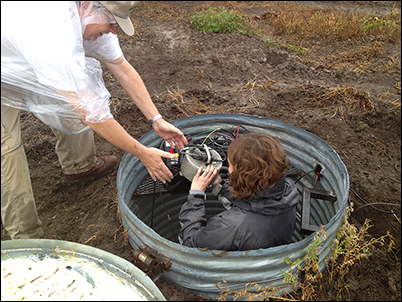In April, the Arizona legislature passed a bill that would zero out the budget of the Arizona Geological Survey (AGS), an independent state agency, and transfer its duties to the University of Arizona. By May, Arizona governor Doug Ducey had signed the bill into law.
Fundamentally—and this will be difficult—we must be willing to take risks, step into political arenas, and fight for the work that we do.
The result: the AGS had a matter of weeks to relocate and negotiate for substantially reduced one-time funding from the university with no certainty of long-term appropriated support. Many AGS staff members, uncertain over their future, left to find new jobs. Those who remained faced a hurried relocation and the disposal and transport of data, records, and samples assigned to AGS’s care.
The AGS is hardly alone. Across the nation, state geological surveys are facing dramatic budget shortfalls, dwindling resources, and shrinking staff. The survival of state surveys depends on creative funding sources and adaptable plans. Fundamentally—and this will be difficult—we must be willing to take risks, step into political arenas, and fight for the work that we do.
Shrinking Surveys: A Nationwide Trend
The AGS is not the first to be summarily relocated with a dramatic impact on its staff. In 2013 the Colorado Geological Survey was moved out of the state’s Division of Natural Resources and into the Colorado School of Mines.
The AGS’s move is not the first time that a state geological survey has faced significantly reduced financial support. This year, the Illinois State Geological Survey, along with its sister surveys at the Prairie Research Institute at the University of Illinois, was hit with a 20% budget cut. In 2011 the Nevada Bureau of Mines and Geology, part of the University of Nevada, Reno, absorbed a 50% budget reduction.
At least 14 state geological surveys have gone through significant budgetary reductions, major structural reorganizations, or both.
These are not outliers. In the past decade, at least 14 state geological surveys have gone through significant budgetary reductions, major structural reorganizations, or both; depending on your definition of “significant budgetary reductions,” that number could be even higher. For example, my own state survey in Kansas has undergone smaller but regular budget cuts that have been passed along to us through our host institution, the University of Kansas.
Each of these stories is slightly different. Circumstances vary from state to state. But the result is the same: State geological surveys face existential threats, no matter if they are part of a university or a state agency, whether they are big or small. If you think it can’t happen in your state, think again.
Are State Surveys Being Targeted?

On the basis of my review, I do not believe that the geosciences have been targeted for especially harsh treatment.
Budgets in many state governments have been cut over the past few years. A quick Google search turns up state budget problems from Connecticut to Alaska. A number of states, including Kansas, are struggling with revenue shortfalls, some caused by tax cuts, some due to lower energy prices in states that rely on oil and gas revenue.
Either way, it does not appear that state surveys are being singled out for cuts or relocation. But neither are they being spared. The geosciences do not seem to be any more valued than other components of state government. And they sometimes appear to be valued less.
To geoscientists, this lack of budgetary priority is deeply troubling. State geological surveys focus on research and service of direct relevance to the states they serve. In the midcontinent, state geological surveys provide information that is critical to understanding and managing the High Plains/Ogallala aquifer. In energy-producing states, state geological surveys provide data and collect samples that are important to oil and gas exploration. My own state geological survey has been heavily involved in studying and responding to induced seismicity. The Florida Geological Survey has been a leader in dealing with sinkhole issues. On the West Coast, state geological surveys are addressing geologic hazards such as seismicity, tsunamis, and landslides.
How Do We Get States to Recognize the Value of Surveys?
State geological surveys know the importance of explaining their relevance and impact, especially to the economic life of their states and to the general public. They know that communication is especially important in states that rely heavily on geologic resources or face significant geologic hazards.
Yet explaining our relevance is not enough. It appears to me, at least, that survival demands that we become more politically involved, making sure that decision makers know, understand, and are willing to argue for the work that we do.
This is not a role that comes naturally to scientists, but we have to make sure that decision makers, especially legislators, appreciate our work. By the time politicians question our value, it is already too late.
The worst time to develop a relationship is when you need it.
The worst time to develop a relationship is when you need it. Instead, proactively developing political support is central to our survival. At the Kansas Geological Survey, for example, we operate an annual multiday field trip for legislators and other decision makers, exposing them to the state’s natural resource issues and making clear the role we play in learning about those issues.
However, many geological surveys are not allowed to make direct contact with legislators and must rely heavily on the political support of their users. And that may not be enough.
State government is reinventing itself in all sorts of ways, right before our eyes, and that means state surveys must too. They must be more agile, develop diversified sources of funding, and take on new roles and responsibilities.
Some state surveys have done that and come out the other end of this process as even stronger, more vital organizations. But the change can be wrenching, the challenge considerable.
And it doesn’t always work. The AGS had strong support from industry groups in mining, real estate, and home building, but the desire to reduce state government overrode their concerns.
Political Engagement Will Be Key
Perhaps more important, what has happened to some state geological surveys should serve as notice to the entire geoscience community. The larger world, including the political world, needs to know, understand, and appreciate what we do. We know our centrality to society and the economy. I’m not sure that society and its leaders know it.
The days of doing science in isolation are long gone.
We already do much to explain our work and contributions, but we need to do more and do it more effectively. We need to think harder about our place in the world and our willingness to engage in the political process—locally, statewide, nationally—that we may find distasteful. We need to speak the language that politicians understand, not the technical jargon that we are comfortable with.
Perhaps most important, we need to walk the fine line of entering the public arena and making ourselves heard, without losing our scientific credibility. The days of doing science in isolation are long gone. Climate change, fracking, water shortages, energy exploration, minerals, landslides, earthquakes (induced and otherwise)—these are huge topics that are in our wheelhouse. We know that. Lots of people don’t.
We should be long past wake-up calls. Let’s make sure we don’t get another one.
—Rex Buchanan, Kansas Geological Survey, University of Kansas, Lawrence; email: [email protected]
Citation:
Buchanan, R. (2016), State budgets, geological surveys, and the new reality, Eos, 97, https://doi.org/10.1029/2016EO059893. Published on 26 September 2016.
Text not subject to copyright.
Except where otherwise noted, images are subject to copyright. Any reuse without express permission from the copyright owner is prohibited.
Text not subject to copyright.
Except where otherwise noted, images are subject to copyright. Any reuse without express permission from the copyright owner is prohibited.

